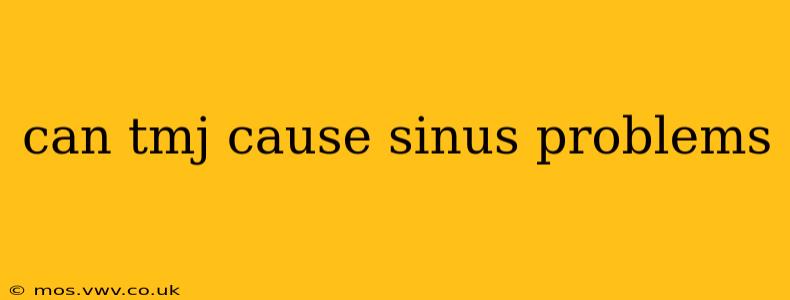Temporomandibular joint (TMJ) disorders and sinus problems might seem unrelated, but there's a surprising connection between these two seemingly disparate conditions. The proximity of the TMJ to the sinuses, along with the intricate network of nerves and muscles in the head and face, means that problems in one area can often impact the other. This article will explore this connection, answering common questions and providing valuable insights into the relationship between TMJ and sinus issues.
What is TMJ?
TMJ refers to the temporomandibular joint, the hinge connecting your jaw to your skull. TMJ disorders (TMD) encompass a range of conditions affecting this joint, causing pain, clicking, locking, and limited jaw movement. These disorders can stem from various factors, including trauma, arthritis, bruxism (teeth grinding), and stress.
What are Sinus Problems?
Sinus problems, or sinusitis, involve inflammation of the sinuses – air-filled cavities located around your nasal passages. This inflammation can be caused by infections, allergies, or structural issues. Common symptoms include facial pain, pressure, congestion, and headaches.
Can TMJ Cause Sinus Pain?
Yes, TMJ can contribute to sinus pain or symptoms that mimic sinusitis. While TMJ doesn't directly cause sinusitis (like an infection would), the close anatomical relationship between the TMJ and sinuses means that dysfunction in the jaw joint can refer pain to the sinuses. This is because the same nerves that innervate the TMJ also supply the sinuses and surrounding facial structures. Therefore, pain originating in the TMJ can be perceived as sinus pain.
How Does TMJ Refer Pain to the Sinuses?
The trigeminal nerve is a major player here. This nerve branches out to innervate the TMJ, sinuses, and other areas of the face. When the TMJ is inflamed or dysfunctional, the nerve signals can become confused, leading to pain felt in the sinuses, even though the sinuses themselves may be perfectly healthy. Muscle tension in the jaw can also put pressure on surrounding structures, potentially contributing to sinus pressure and discomfort.
Can Sinus Problems Cause TMJ Pain?
While less common, it's possible for sinus problems to indirectly contribute to TMJ pain. Severe sinus infections or inflammation can lead to significant facial pressure and swelling, potentially affecting the TMJ and causing discomfort. The pressure from inflamed sinuses can also interfere with proper jaw movement, exacerbating existing TMJ issues.
How are TMJ and Sinus Problems Diagnosed?
Diagnosing the root cause of facial pain requires a comprehensive approach. A doctor or specialist will conduct a thorough examination, considering both TMJ and sinus possibilities. This may involve:
- Physical examination: Assessing jaw movement, range of motion, and palpation of the TMJ and facial muscles.
- Imaging studies: X-rays, CT scans, or MRI scans might be used to visualize the TMJ and sinuses and rule out structural abnormalities.
- Sinus examination: Assessing nasal passages, checking for inflammation or discharge.
What are the Treatment Options?
Treatment approaches will depend on the underlying cause of the pain. For TMJ disorders, treatment might include:
- Physical therapy: Exercises and stretches to improve jaw mobility and reduce muscle tension.
- Medication: Pain relievers, muscle relaxants, or anti-inflammatory drugs.
- Splints or mouthguards: To help protect the teeth and jaw joint from further damage.
- Lifestyle adjustments: Stress management techniques, improved posture, and dietary changes.
For sinus problems, treatment might include:
- Decongestants: To relieve nasal congestion.
- Nasal sprays: Saline sprays or corticosteroid sprays to reduce inflammation.
- Antibiotics: If a bacterial infection is present.
It's crucial to consult a healthcare professional for proper diagnosis and treatment. They can determine whether your facial pain originates from TMJ dysfunction, sinusitis, or a combination of both. Self-treating can delay proper diagnosis and lead to worsening of symptoms.
What if I have both TMJ and Sinus Issues?
If you're experiencing symptoms of both TMJ and sinus problems, it's essential to seek a comprehensive evaluation. Treatment may involve addressing both conditions simultaneously, often with a coordinated approach involving both a dentist specializing in TMJ disorders and an ENT (ear, nose, and throat) doctor. The coordinated treatment plan will address both the jaw joint and the sinuses to manage the overall pain and improve function.
This article provides general information and should not be considered medical advice. Always consult a qualified healthcare professional for diagnosis and treatment of any medical condition.
